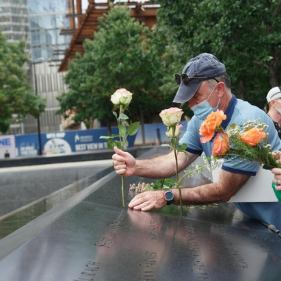How This Plague Made Us Stronger

By Yael Brenner, Leanne Sinsky, and Ilya Bratman
At 2:30pm on March 11, 2020, just as our sephardic Jewish learning programs were finishing, Governor Cuomo shut down the CUNY schools for the rest of the semester. We were worried. Not because many of our secular students would lose their only Jewish outlet, or our traditional and orthodox students would lose their only secular environment, and not only because our students would lose their communal space for programs and personal growth, but because so many of our students relied on Hillel for some of their most basic needs. Many students ate 1-2 free meals every day at Hillel. They depended on Hillel staff and students for emotional support. They took advantage of career opportunities. And Hillel even employed over 60 students in various paid roles.
Before the pandemic, 52% of our students faced low to moderate food insecurity, 63% were looking for work in the past year, and 31% suffered from major and severe depression. We can only imagine what these numbers look like today. To make matters worse, CUNY lacks the proper resources to support students adequately. Our first-generation students often can’t turn to their parents for financial or career support, and face intense stigmas towards mental health issues.
Our Hillel became committed to doing this work and shifted to becoming an institution which would now offer human resources and social services. Our Hillel designed a new approach to serve our students – Hillel Cares became the vehicle to serve our students in critical ways in order to help them meet their most basic needs. In the first two weeks of the pandemic, Hillel staff called every single student to offer them every service we could.
In collaboration with MetCouncil, we distributed food packages and groceries to students and their families who faced food insecurity. Many of these students and their parents lost their jobs.
Our staff and social work interns provided mental health counseling to over 500 students. We met with students who needed personal and emotional support to navigate the challenges of 2020. We even helped dozens of students stay in school through our counseling and guidance.
We completely revamped our Engagement Internship to empower our students to support their peers and to accommodate their crucial needs. Our students are so overwhelmed by Zoom, so our engagement interns call their peers every week to check in on their well-being.
In addition, with the support of the UJA-Federation and Hebrew Free Loan Society, we were able to provide financial assistance to the students who needed it most.
After so many students lost their jobs and summer internships, it was imperative to us that our students needed career support and guidance. We were able to deploy our wonderful career counselor to prepare students for future opportunities. And we started a remarkably successful Executive Mentorship Program, in collaboration with UJA-Federation. We have matched 46 students with professionals in their field. These 46 mentors and mentees met virtually throughout the summer and fall and developed an expansive network, which has the capacity to support our students for years to come.
We were even able to provide tech support to our students, sending them WiFi extenders and other equipment, so that they can attend school without interruption.
Our Hillel is nothing without our students. Our mission is to enrich their lives, so that they can enrich the world in return. However, we cannot accomplish our mission without taking care of their basic needs. Our students are our mission, and they depend on Hillel to succeed in college, and in often their personal and professional lives. We are blessed to be able to serve their most essential needs in these dark and uncertain times.
We were fortunate to receive the Hillel International Global Assembly’s 2020 Award on December 14th. This recognition exemplifies the work that is currently required to sustain our community while caring deeply for our students. The potential of our work is extraordinary. The lessons of COVID-19 have made us stronger, more thoughtful and more resilient. We will survive this plague and our community will be strengthened by it.
Yael Brenner is Assistant Director; Leanne Sinsky is Director of Engagement; and Ilya Bratman is Executive Director at Hillel at Baruch, City, John Jay, SVA, Pace, FIT, New School and Fordham University.